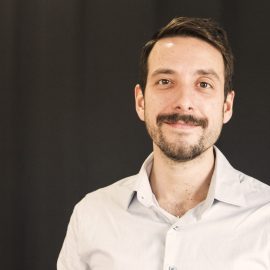The Elms

Mitchell vanished from my life more abruptly than anyone had. Though we had been exceptionally close as children, he came infrequently to mind as I grew older. High school graduation then college in Upstate New York, my first job, and my first kiss with another man, all passed without a thought of Mitchell. It was an occasion of violence, one that shook my unvaried life and sent it hurtling sideways, touching off a period of confusion and loneliness, that the image of Mitchell finally returned to me, and I saw him as a boy, through the eyes of my younger self, walking along the stretch of the Neversink River that was our refuge. It happened while I was living in Philadelphia, it was autumn, and the man I had loved for the previous eight months had beaten me bloody and left me on the floor of my apartment. He turned the lights off on his way out, and Mitchell’s face rose in the darkness. The blood pumping in my ears sounded like our river. It was the time of year when its spirited current was clearest, an unsullied vein of mountain water beside which a boy could tumble from the branch of an elm and land unbroken on a cushion of dry leaves. As children, Mitchell and I were too timid to climb those trees, but I was no longer concerned with falling.
The first leg of my return to Cuddebackville was the hardest. As my train out of Philadelphia pulled forward, the allure of the place—no doubt my memories were idealized—weakened to a pulse in my ears, a quiet homing signal, barely discernible. In a flash, I saw myself returning to my apartment and mending the life I had built before the violence, a process that could begin once I forgave the man I had built it with, which I could also too easily envision. But I was out to prove that I could flee from my desires, and through distance, diminish their hold.
At Trenton station, while I waited for my second train, a distraction manifested in the form of a man around my age pacing the platform, overfull satchel hanging from a shoulder, black toggle coat buttoned tight to his chin. He checked his phone often, running the fingers of his left hand through his hair, which was dark brown and flecked with white. He was delicately seasoned, his cheeks freckled, his beard sparse. When we finally locked eyes, he looked away. When I stood, he took a step toward the stairwell, and in a gesture more invitation than retreat, hustled toward the other end of the platform. Our train arrived, he entered the third car, and I sat across the aisle.
What did he think when he saw my bruised, swollen face up close? That I’d loved the wrong man? Loved the right man the wrong way? I was confident I could explain myself in a way that cast me as more courageous than naïve.
“Ouch,” he said, and quickly looked away. This man’s attention was a delicate bird, the flitting sort that when it alighted on me, felt both pointed and fragile, his gaze so like feathers. I tapped the purple flesh below my left eye, but instead of the truth, I told him I had been in a bus accident. At Market Street and 20th. His eyes widened, but after the conductor punched our tickets, he immediately stood up. He told me his friend had gotten on at the previous station and was waiting for him in the next car.
“What’s your number?” I asked, reaching toward him, stopping before our fingers could meet. “I’ll be at my parents’ for the week with nothing to do.” He fluttered his left hand, which seemed accustomed to the work of a cellist or guitar player. I was certain they could grip and tune with precision. He took out his wallet and handed me a business card, which I slipped into my jacket pocket.
“Excuse me,” he said, and he pushed through to the next car. When he got off the train just one stop before my own, I texted him. hi. i’m Cameron.
Ten minutes later, I disembarked and made for my father’s car, which idled at the sidewalk. My desire for the man on the train—his name was Ian—flared larger in the evening chill. I saw that he could be more than a distraction. Often quick to attach, always inclined to see the best in men, I imagined Ian might release me from my desire to return too soon to Philadelphia. But could I convince myself that Ian was the kind of man who might love me? That was essential.
When I was just a few steps from my father’s car, I held the hope that he would retreat the way Ian had, vanish into the blank compartment of October night beyond the parking lot’s halo. In his absence, I could wander alone into that emptiness—town was only a couple miles away—until I reached the river where the companionable elms stood sentry. I would ask Ian to meet me there, curl up with him beneath the starless sky, watch the faint moonlight sift over the branches, granting our bodies the patina of old bone.
“I hope that shithole city paid your ER bill,” my father said when I fell into the passenger seat. He gave the gearshift a violent tug and we pulled away with a chirp. I had already told my father about the phony bus accident over the phone. I’d had a great deal of practice lying to him.
“Your mother’s asleep,” he said. “Keep quiet when we get home.”
“I was hoping to go for a drive,” I said. “Can I take her car?”
He nodded, and his shoulders relaxed some. This was a habit of mine that began in high school after Mitchell stopped returning my calls, one that my father had always indulged. He wanted me out of the house as often as possible, and there were times, after our worst fights, when I wondered if he hoped something terrible would befall me.
When we got to the house, I slipped quietly into my bedroom and laid my suitcase on the dresser. Again, I regretted coming home. I was a gay man who had long enjoyed the privilege of casting off my former self, but no matter who I pretended to be, Cuddebackville would always be the place where I first reckoned with my curiosities and desires, where I entertained those early and treacherous internal dialogues about what could be hidden and for how long. I’d been a lonely kid, but I’d earned excellent grades. I’d gotten good enough at the trombone to get accepted to conservatory, though my family didn’t have the money for tuition. I studied math at a state school instead, got a decent job in the accounting department at a hospital. I’d done it all well. I’d done it before I knew the man who hit me, but there had been other pains.
I grabbed a protein bar from the kitchen, but it was the last one in the box. I put it back and took my mother’s keys from their usual place.
To read the rest of this story, please purchase a copy of Issue #20 or subscribe to the print edition.
